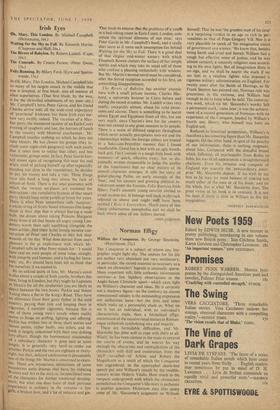Irish Eyes
z
Felix Running. By Hilary Ford. (Eyre and Spottis- woode, 15S.) IN Oh, Mary, This London, Michael Campbell hits so many of his targets smack in 'the middle that one is tempted. at first blush, into all manner of alien superlatives. (That first blush, by the way, is for the shrivelled inhabitants of my poor city.) Mr. Campbell's hero, Peter Gavin, and his friend Charles arrive with all the wide-eyed expectancy of 'provincial' Irishmen, but those Irish eyes nar- row very swiftly indeed. The vacuities of a May- fair party, the mannered squalor of an Earls Court evening of spaghetti and lust, the horrors of lunch in the country with blazered exurbanites: Mr. Campbell touches nothing on which he does not raise blisters. He has chosen his groups (they in- clude some night-club gangsters) with such nicety that it takes time to realise that other, and less vulnerable, groups exist. In fact, Peter Gavin him- self shows signs of recognising this near the end When, tired of picking himself up after repeatedly standing too close to the roundabout, he decides to pay his money and take a ride. Three things raise this book a long way above the ruck of school-of-Amis. There is the total assurance with Which the various set-pieces are mounted for destruction—the cumulative hysteria of that smart Party should keep some people at home for years. There is what Peter somewhere calls lantaisie,' a whole string of firmly based whimsies (the lamp- shade in their digs that is always leaving a nude bulb, the dream about taking Princess Margaret away from it all that besets all angry young Lon- doners worth their salt) squibbing alongside the main action. And there is the mostly incisive con- versation of Peter and Charles as they lick their wounds of the day. What does detract from one's Pleasure is the pi explicitness with which Mr. Campbell tells us what Peter stands for : 'I would have said we were people of some value, straight, With integrity and humour, and a feeling for litera- ture,' etc. We should have been left to think that for ourselves, if we wanted to.
By an unkind quirk of fate, Mr. Martin's novel is also about a couple of Irish youths, brothers this time, living in London, but they might be Laputans to Mexico for all the similarities you are likely to detect between the two books. Perkin and Simon Young share a flat in the King's Road. They have an allowance from their gusty father in the ould country, paying their rent and keeping them in cigarettes. I mention cigarettes, because this is one of those young men's novels where reality seems to hinge on pulling, lighting and offering.
Perkin has written two or three short stories and Simon paints, rather badly, one infers, and the book is largely concerned with their two drifting love-affairs, though the homosexual relationship of a subsidiary character is gone into at some length. It is generally very hard to make out Whether Perkin and the rest are eighteen or thirty- eight, but then, delayed adolescence is presumably one of the things Mr. Martin is concerned to exam- ine. There are mysterious intimations of some thunderous early dramas that have, by reducing
Women and Art to the deja-ett, incapacitated most of the characters for further emotional develop- ment; but what one does learn of their previous experiences is ordinary in the extreme —a few girls, a broken love, and a lot of tobacco and gin. 'One tends to assume that the problems of a youth in a bed-sitting-room in Earls Court, London, con- stitute the spiritual dilemma of our time,' says Peter Gavin in Mr. Campbell's book, and it really does seem as if sonic such assumption lies behind Waiting for the Sky to Fall. There is a good deal of that elegiac mid-winter scenery with which Elizabeth Bowen clutters the surface of her simple stories and which may take its usual toll of those who confuse a pleasing melancholy with wisdom. But Mr. Martin's second novel must be considered, after the fervid reception accorded to his first, an astonishing disappointment.
The Rivers of Babylon has another anemic hero %,■ ith a small private income, Charles Har- bord, a university lecturer in Cairo before and duning the recent troubles. Mr. Liddell writes very neatly. snappishly almost, about his mild excur- sions and alarms. There is something to be learnt about Egypt and Egyptians from all this. but not very much, since Charles's love for the country does not extend in any great measure to its people. There is a sense of diffused epigram throughout which never actually precipitates into wit and the relationships within the foreign colony are treated in a Saki-cum-Peyretitte manner that I found- insufferable. Good fun is had with an ugly hunch- back girl. The Comrade is a tough little book with moments of quick, effective irony; but so dis- jointedly written (impossible to judge the quality of the translation) that no clear picture of its central. character emerges. It tells the story of guitar-playing Pablo. an early example of the. 'beat,' and his amours and growing political in- volvement under the Fascists. Felix Running finds Kilary Ford's .uncouth young novelist abroad to avoid income tax. It belongs well back in the ruck. referred to above and might well have been entitled / Hate it Everywhere. Much more of this cheap unhumorous xenophobia and we shall be back where some of our fathers started.
JOHN COLEMAN,






































 Previous page
Previous page